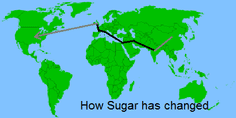|
The word sugar has done a complete pivot in direction, concerning its definition. Originally, it came from the French word sucre, which came from the older French word cucre, which came from the Latin word succharam, which came from the Arabic word sukkar (where we get Spanish azucar from), which came from the Persian word shakar. At this point, all the way you trace it back, to about 600 CE, this foud noun still had the same meaning and generally followed the path that sugar itself came to Europe. Then it got interesting. Etymologists agree that this can be further traced back to the Sanskrit term for "sugar", sharkara. However, this word did not originally mean "sugar". In fact, its definition was "gravel, grit, or dirt", which because of sugar's texture, was attributed to the white stuff itself (that being sugar). Thus a complete turnaround occurred, from grey, yucky grit to white, tasty saccharine powder (saccharine also came from the Sanskrit word). Some of my sources identify this as the offspring of the Proto-Indo-European word korkeh, "gravel or boulder". But wait! It may not be from PIE! A researcher for the National Center for Biotechnology Information identified the etymology as coming from the Chinese word sha-che, "sugar", completely bypassing the gravel theory. Though the other is more logical, this is an interesting alternate theory...
0 Comments
Leave a Reply. |
AUTHORHello! I'm Adam Aleksic. I have a linguistics degree from Harvard University, where I co-founded the Harvard Undergraduate Linguistics Society and wrote my thesis on Serbo-Croatian language policy. In addition to etymology, I also really enjoy traveling, trivia, philosophy, board games, conlanging, and art history.
Archives
December 2023
TAGS |



